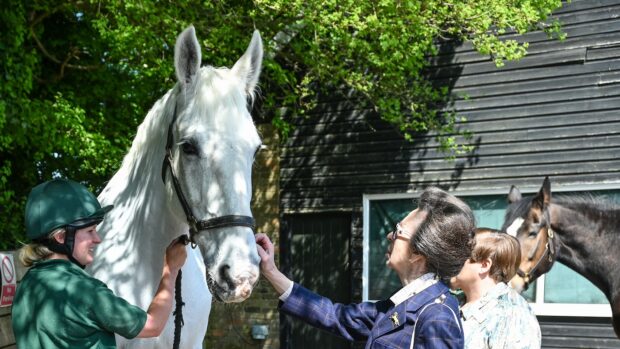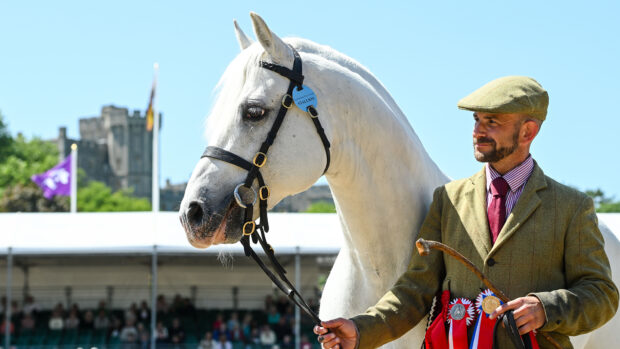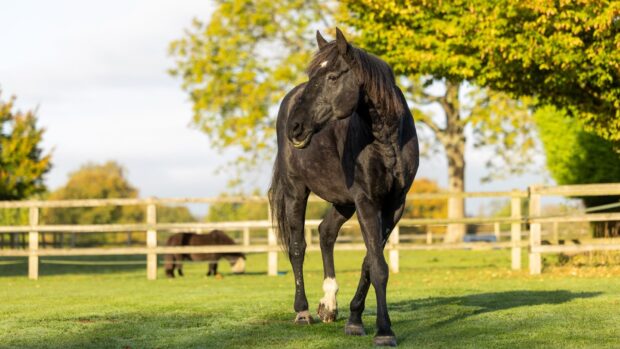PREVENTING weight gain is the key to battling equine obesity – but a pioneering initiative in showing is helping make positive changes, vets believe.
The Horse Trust’s Healthiest Body Condition Awards, which have been running since 2019, were presented in some showing classes at Royal Windsor Horse Show (10–14 May). Vets assessed the animals aside from the class judging and presented rosettes to those in the healthiest condition.
One of these was Jane Nixon, an experienced equine vet who is also chair of The Showing Council and an advocate for keeping equids at a healthy weight.
“I was absolutely delighted,” Dr Nixon told H&H. “It was a marked improvement from what I’d seen in the past, particularly when I was showing, between 1985 and 2010, and I think there’s true understanding now of the importance of body condition.”
Dr Nixon said she spoke to all the exhibitors in her classes, and “there was understanding and appreciation” of the importance of a healthy weight, although some found it difficult to maintain this, especially in older horses who had been overweight in the past.
She said the “overwhelming majority” in the working hunter classes were of a healthy weight, “the most pleasing being the heavyweight class”.
“This is what we’re looking for – not just one healthy horse but a large population,” she said. “How proud I was of those people, they should be ambassadors.”
Dr Nixon added that the coloured classes were “thought-provoking”, as from the ringside, she assessed many as obese, but in the ring, saw that some of the horses’ deep ribcages and large shoulders made them look fatter than they were.
“That’s not to say you needn’t worry, but those people had worked very hard,” she said. “Apart from some big crests and fat at tail-heads, I was really quite pleased.”
Dr Nixon said her two main messages are not to let horses get fat in the first place, as losing weight is then a challenge, and to keep a particular eye on crests and tail-heads as areas that reveal excess fat.
“There was one rider I spoke to and told her her horse was beautiful but overweight,” she said. “I said that in five years, I didn’t know if it would be as good if she didn’t get the weight off and she was very receptive. People were asking for information and education and that’s the big aim. It boils down to producers engaging and judges making sure they don’t place anything overweight, and commenting on that.”
Vet Lucy Penrose, who was also assessing for the awards, said most competitors were happy, and many asked for their horses’ body condition scores in the ring.
“The Welsh section C award winner, Ringside Poker Dot owned by Georgina Williams and ridden by Izzie Williams, was a fine example of a fit native, and as the only junior in the class, this prize meant the judges invited Izzie to do the lap of honour and it made their day,” she said. “Pleasingly, the riding horses had some joint class winners because there were multiple fit horses in the classes.”
A spokesman for the awards told H&H the initiative is kept under review but “we feel the initiative in its current form is really making headway in the showing fraternity”. A Facebook page is to be launched to share award-winners’ stories and news, and another forum will run this summer to discuss progress.
Shows at which the awards will feature this summer include the Great Yorkshire and Royal Cornwall, the Hickstead Derby and Royal International meetings, and local shows.
British Equine Veterinary Association (BEVA) veterinary projects officer Lucy Grieve told H&H that BEVA was pleased to hear the awards were well received at Royal Windsor.
“It was encouraging to see the reduction in number and degree of overweight horses presented at these top-level showing classes,” she said. “Thanks to the continued hard work of equine charities and veterinary community in raising awareness of the risks of allowing horses to gain excessive weight, we are seeing healthier horses and ponies entering the show ring. However, there is still work to be done.
“Most of us are aware of how hard it is to lose excess weight once it has been gained, therefore we urge owners and breeders, within showing and across the board, to focus on preventing weight gain in the first place and to rethink their horse management to make equine obesity a thing of the past.”
You might also be interested in:

Vets’ extreme disappointment at overweight show horses at Royal Windsor

Major show gives signs of hope in battle against equine obesity

Subscribe to Horse & Hound magazine today – and enjoy unlimited website access all year round
Horse & Hound magazine, out every Thursday, is packed with all the latest news and reports, as well as interviews, specials, nostalgia, vet and training advice. Find how you can enjoy the magazine delivered to your door every week, plus options to upgrade your subscription to access our online service that brings you breaking news and reports as well as other benefits.




